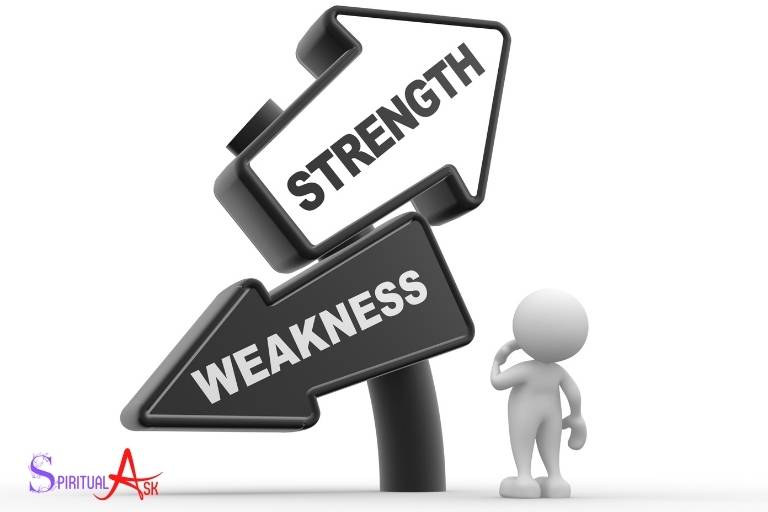Spiritual Gifts Strengths and Weaknesses: Understanding!
Spiritual gifts strengths and weaknesses refer to the positive and negative aspects of the unique abilities given to individuals by the Holy Spirit for the purpose of edifying and serving the church community.
Spiritual gifts are divinely bestowed talents and abilities that empower individuals to perform specific functions within their religious community.
These gifts can be both a source of strength and weakness, as individuals learn to use them effectively and humbly.
Spiritual gifts have the potential to bring people together, inspire growth, and strengthen the overall spiritual community.
However, they can also lead to misuse, pride, or overdependence on specific individuals.
The key to harnessing these gifts lies in recognizing and utilizing them with humility and a genuine desire to serve others.

Key Takeaway
10 Type Spiritual Gifts Strengths and Weaknesses:
| Spiritual Gift | Strengths | Weaknesses |
|---|---|---|
| Prophecy | Clear perception of truth, ability to convey messages from God | May come across as blunt or insensitive, potential for pride |
| Teaching | Effective communication of knowledge, ability to explain complex concepts | Can become overly intellectual, may neglect personal relationships |
| Exhortation | Encouragement of others, ability to motivate and inspire | Can be overly optimistic, may avoid confronting difficult issues |
| Giving | Generosity, willingness to bless others | Struggle with maintaining personal boundaries, may enable unhealthy behavior |
| Leading | Visionary thinking, strong organizational skills | Can struggle with delegation, may become overly controlling |
| Mercy | Compassion, sensitivity to the needs of others | Can become overly empathetic, may neglect personal well-being |
| Healing | Ability to bring physical, emotional, or spiritual healing | May struggle with setting limits, can become overwhelmed by needs |
| Discernment | Deep spiritual insight, ability to discern truth from falsehood | Can become overly critical, may struggle with trust |
| Tongues | Ability to communicate in unknown languages, often used in prayer | Can be misused or misunderstood, may cause confusion or division |
| Interpretation of Tongues | Ability to interpret the messages of those speaking in tongues | Can be misused or misunderstood, may be limited in application |
Understanding Spiritual Gifts
Delving into the realm of spiritual gifts necessitates a discerning look at the inherent capacities and divine empowerments that are believed to be endowed upon individuals within various religious and spiritual traditions.

You’re tasked with examining these gifts not as esoteric mysteries, but as phenomena with potential implications for personal growth and community enrichment.
Spiritual gifts may range from prophetic insights to extraordinary compassion, each with its own set of strengths and potential drawbacks. These gifts can empower individuals to uplift and inspire those around them, but they can also lead to feelings of isolation or overwhelm if not managed properly. For example, someone with an INFJ personality and empathy might find themselves deeply affected by the emotions of others, making it challenging to establish healthy boundaries. Ultimately, the key lies in harnessing these spiritual gifts while being mindful of their impact on personal well-being.
Your analysis must weigh these gifts’ capacity to foster unity and edification against the risk of misuse or misunderstanding. It’s crucial to consider how these gifts can be nurtured responsibly and integrated into broader spiritual practices.
You’re exploring not just the existence of such gifts, but their practical impact on individual and collective spirituality.
Empathy: Compassion and Overwhelm
You possess the ability to nurture others through a profound understanding of their emotions, a hallmark of empathetic spiritual gifts.
However, this deep connection with the feelings of those around you carries the risk of emotional burnout, necessitating careful self-management.
Analyzing this duality, it’s crucial to balance your compassionate engagements with strategies to protect your own emotional well-being.

Nurturing Through Understanding
Empathy, often regarded as the cornerstone of emotional intelligence, enables individuals to resonate with others’ emotions, fostering compassion but also potentially leading to emotional overwhelm.
As you nurture through understanding, you are engaging in a delicate balance. This empathy allows you to provide support and comfort, recognizing and validating the feelings of others.
However, it’s crucial to maintain boundaries to prevent taking on excessive emotional burdens that can lead to burnout.
Analytically, the strength of empathy lies in its capacity to facilitate deep interpersonal connections and promote healing.
Conversely, the weakness emerges when the absorption of others’ distress overshadows one’s emotional stability. Your challenge is to cultivate empathy in a way that sustains your well-being while providing solace to others.
Emotional Burnout Risk

While nurturing through understanding bolsters interpersonal connections, it’s essential to consider how sustained empathetic engagement can heighten the risk of emotional burnout.
When you consistently absorb others’ emotions, you may find yourself on the precipice of emotional exhaustion, a state where your capacity for compassion can become compromised.
This vulnerability is critical to acknowledge in the journey of self-awareness and spiritual development.
Consider these potential indicators of emotional burnout:
- A pervasive feeling of emotional depletion, akin to a well run dry
- The emergence of irritability in place of patience when dealing with others’ emotional needs
- A withdrawal into oneself, signaling a retreat from the forefront of empathetic interaction
- The onset of cynicism, a defensive shield against the barrage of external emotions
Recognizing these signs is imperative to maintain a healthy balance between empathy and personal well-being.
Intuition: Insight and Isolation

Your intuition serves as a powerful tool, providing you with profound insights that often surpass logical reasoning.
However, relying on this inner guidance can lead to a sense of isolation, as your distinctive understanding isn’t always shared by others. It’s crucial to balance your trust in gut feelings with the need for social interaction and external validation.
Trusting Gut Feelings
How often do you heed the subtle nudges of your intuition, those gut feelings that offer uncanny insight yet simultaneously risk leading to isolation when they diverge from the collective reasoning of those around you?
Trusting your intuition can be a double-edged sword, characterized by the following:
- A whispering premonition that guides you through a fog of uncertainty.
- An invisible thread pulling you towards a decision, against the tide of popular opinion.
- A lone beacon in the dark, illuminating truths that others may not see.
- The solitary echo of a unique perspective, often unheard in the cacophony of groupthink.
Harnessing this gift requires discernment; it’s imperative to balance the profound depth of personal insight with the potential alienation from communal consensus.
Solitude in Sensitivity

In the realm of intuition, solitude often emerges as both a sanctuary for sensitivity and a potential source of isolation, shaping the contours of one’s internal and external worlds.
You may find that your intuitive nature thrives in the quietude where insights can surface without the clamor of external input. This sensitivity, while a profound strength, may also lead you toward seclusion as a defense against overwhelming stimuli.
Yet, it’s crucial to recognize that excessive solitude can foster isolation, detaching you from the enriching interplay with various perspectives and experiences.
Balancing your need for solitary reflection with meaningful connections is essential. It allows you to ground your insights in the shared reality and prevents the alienation that unchecked isolation can breed.
Healing: Restoration and Drain
Healing, as a spiritual gift, involves the restorative process that can rejuvenate individuals physically, emotionally, or spiritually, but it often comes with the potential for personal energy depletion in the healer.

The act of healing requires a delicate balance between the transfer of wellness and the conservation of the healer’s vitality. Understanding this dynamic is crucial for the effective use of this gift.
Consider the following imagery to grasp the concept:
- A nurturing stream flowing from the healer to the healed, which may gradually dry up if not replenished.
- The gentle glow of a candle providing light and warmth, slowly melting away in service.
- A battery channeling energy to a device, inevitably draining over time.
- The healer as a gardener, tending to flowers while their own reserves of strength are sapped.
In these examples, the consistent theme is the finite nature of the healer’s energy, underscoring the necessity for self-awareness and self-care to maintain the gift’s sustainability.
Prophecy: Guidance and Misinterpretation
Prophecy serves as a beacon, offering guidance and foresight in a world frequently shrouded in uncertainty, yet it also holds the potential for significant misinterpretation when its messages are not discerned with clarity and wisdom.

You must approach prophetic insights with both openness and skepticism, as the line between true revelation and fallacious assumption is often thin and blurred.
The prophetic gift can illuminate paths and reveal truths, but it requires a careful balance between faith and reason to prevent the distortion of its intent. Misinterpretation can lead to false expectations, misguided actions, and disillusionment.
Therefore, it is imperative to critically evaluate prophetic messages, seeking corroboration and counsel, to harness this spiritual gift effectively for constructive purposes rather than succumbing to error.
Discernment: Clarity and Skepticism
Discernment, as a spiritual gift, demands rigorous scrutiny and a healthy dose of skepticism to differentiate truth from deception with precision.

You’ll find that your ability to discern can act as a beacon, guiding you through the fog of uncertainty that often surrounds spiritual matters. However, it’s essential to apply this gift thoughtfully to avoid the pitfalls of cynicism or closed-mindedness.
- A magnifying glass revealing the minute details in a complex pattern
- A lighthouse piercing through a dense mist, symbolizing the clarity that discernment brings
- A scale in perfect balance, representing the careful weighing of evidence
- A lock and its corresponding key, illustrating the unlocking of deeper understanding through discernment
Harnessing discernment thoughtfully provides you with a powerful tool to navigate the spiritual landscape, ensuring that you remain open yet critical of the multifaceted truths you encounter.
Conclusion
In embracing your spiritual gifts, you tread a double-edged sword; each strength bears its shadow. As you navigate these waters, remember that “too much of a good thing can be wonderful,” but also overwhelming.
Cultivate balance, remain grounded in self-awareness, and judiciously apply your gifts. By doing so, you’ll harness their potential without falling prey to their inherent weaknesses, thus embodying the full spectrum of your spiritual capacities with wisdom and grace.
FAQ for Spiritual Gifts Strengths and Weaknesses
What are spiritual gifts?
Spiritual gifts are special abilities that are given by the Holy Spirit to believers in Jesus Christ for the purpose of building up the body of Christ and reaching out to the world. They are generally divided into three categories: manifestations, ministries, and supernatural abilities.
What are the strengths of spiritual gifts?
The strengths of spiritual gifts include the empowerment to serve others through encouraging, teaching, administration, leading, and caring for those in need. They also provide the opportunity to exercise faith, understanding and discernment in order to better serve the church.
How can I discover my spiritual gifts?
Discovering your spiritual gifts begins with prayer and reflection. Read through the Bible and identify the passages that speak to you. Consider the ministries and activities that you find yourself drawn to, and ask trusted mentors and friends for their input. Finally, consider taking a spiritual gifts assessment to help you better understand your gifts.






